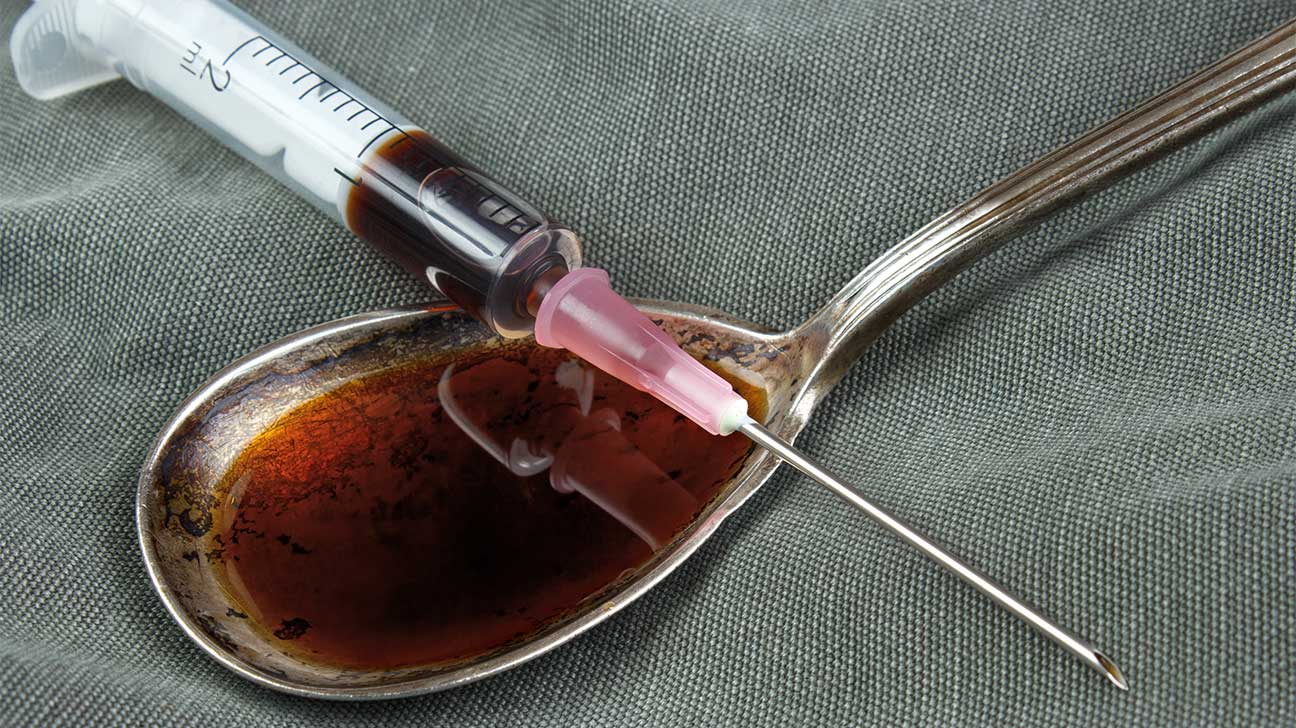
Heroin is an illicit street drug that shares many properties with opioids, although heroin is natural in the sense that it is made from the same opium poppy plant which produces morphine.
The heroin that is sold on the streets can be found in multiple forms but is generally always found in either a powder or solid form.
The different types of heroin can most easily be identified by their appearance, as it is easy to distinguish between the different colors and forms that it is found in.
No matter the formulation, abuse of this opioid can quickly lead to an array of serious health problems, including heroin addiction.
The Different Types Of Heroin
There are three main heroin types that are sold on the street today, these include white powder heroin, brown powder heroin, and black tar heroin.
White Powder Heroin
Pure heroin comes in the form of a soft and shiny white powder. It is generally considered that the whiter the heroin is, the higher the heroin purity.
White powder heroin is easy to lace or cut with other substances because it looks so similar to many cutting agents in appearance.
Cutting agents that are commonly found in white powder heroin are baking powder, flour, laundry detergent, talcum powder, sugar, corn starch, and powdered coffee creamer.
This type of heroin is typically considered the most desirable, but it is also the most expensive kind of heroin and the most difficult to find on the streets.
Learn more about white powder heroin abuse.
Brown Powder Heroin
Brown powder heroin is usually black tar heroin that has been further refined into powder. It is considered between black tar and white powder heroin in terms of price and quality.
In some cases, brown powder heroin is black tar heroin that has been crushed up and mixed with white powder-cutting agents or additives such as lactose or flour in order to be easier to inhale.
Depending on what is added to the brown powder heroin, it can range from a light tan to a dark brown in color.
Brown powder heroin is newer compared to the other types of heroin but is growing in both availability and popularity in the heroin market across the United States.
Black Tar Heroin
Black tar heroin is dark, hard, and sticky in appearance. It is the most unrefined type of heroin that is also the cheapest and considered the lowest quality.
This type of heroin usually comes from Mexico and is made with crude manufacturing processes that allow for a cheaper product. It is sometimes referred to as Mexican heroin.
Common cutting agents that are found in black tar heroin can include dirt, shoe polish, soil, rat poison, and other illicit drugs.
Read more about the dangers of black tar heroin.
Heroin Rock
Heroin rock is a type of heroin that is created when different formulations of powder heroin form into solid nuggets.
This type of heroin can be abused through snorting, injecting, or smoking.
Learn more about heroin rock.
Liquid Heroin
Liquid heroin is a highly potent form of the drug that must first be dissolved in water or another liquid before being injected intravenously using a needle.
Liquid heroin abuse is typically considered more dangerous, as it can be easier to overdose.
Hillbilly Heroin
Hillbilly heroin refers to drug abuse of the prescription opioid oxycodone.
This substance produces similar effects as heroin and is usually cheaper to buy and more readily available on the street.
Read more about hillbilly heroin.
Cheese Heroin
Cheese heroin is black tar heroin mixed with crushed Tylenol PM tablets. This drug takes the form of a tan-colored powder that can be snorted using a small tube.
Learn about cheese heroin.
Krokodil Heroin
Krokodil heroin is typically made in Russia and is created by mixing codeine with different solvents to create a synthetic variant of the drug.
Some of the symptoms of krokodil heroin abuse include severe tissue damage, gangrene, and severe infections that can lead to amputation.
Grey Death Heroin
Grey death heroin is made from a combination of synthetic opioids including carfentanil, U-47700, and heroin.
Due to its potency, the likelihood of an overdose is much more likely when a person is using this formulation of heroin.
Read more about the risks of grey death heroin.
Pink Heroin
Pink heroin was developed by a pharmaceutical company in the 1970s and has recently begun to resurface as a popular cutting agent found in street heroin.
People engage in pink heroin abuse by injecting it, snorting the powder form, or ingesting pink heroin pills.
What Is Synthetic Heroin?
Synthetic heroin can mean a couple of different things. It can refer to heroin that has been cut with synthetic opioids such as fentanyl or carfentanil.
These types of synthetic heroin are often dyed different colors such as pink, blue, or purple heroin, in order to be more appealing to teens and young adults as party drugs.
White powder heroin that has been mixed with fentanyl is known as china white heroin.
The term synthetic heroin can also be a more general term for synthetic opioids, since heroin is a semi-synthetic opiate.
Types of synthetic opioids include:
- fentanyl
- methadone
- tramadol
- hydrocodone
- oxycodone
Prescription opioids such as those above are usually prescribed as painkillers for severe pain or chronic pain.
Dangers And Risks Of Heroin Use
Heroin use comes with many risks and dangers that can affect a person both in the short term and long term.
Long-Term Physical Damage
Using heroin in the long term can result in certain health complications that are directly related to the method of heroin use.
For example, snorting the powder forms of heroin can result in severe damage to the nose and nasal cavities over time.
On the other hand, intravenous heroin use can result in collapsed veins, hepatitis, wound botulism, and dangerous skin infections.
Dependency And Addiction
Heroin is known for being a highly addictive substance, and for good reason. It is currently considered a Schedule I substance by the U.S. Drug Enforcement Administration (DEA).
The longer someone uses heroin and the more severe their addiction becomes, the more dependent they will be on the effects of heroin in order to feel normal.
High Risk Of Overdose
Heroin is a fairly potent opioid, and all types of heroin come with a high risk of overdose. The risk of overdose is even greater when heroin is cut with synthetic opioids such as fentanyl.
Fortunately, there is a heroin overdose antidote called naloxone, which works against any type of opioid overdose.
Naloxone is usually carried by law enforcement officers and is also available to the public in many pharmacies as a harm reduction tool to prevent heroin overdose deaths.
Addiction Treatment For Heroin
Professional addiction treatment for heroin use can make all the difference when it comes to avoiding relapse and achieving long-term sobriety.
Medical Detox
Withdrawal symptoms are usually some of the biggest hurdles for people who are trying to stop using heroin, but medical detox can make the withdrawal period much easier and safer.
People who undergo medical detox for heroin in a professional setting have constant supervision in case anything goes wrong or in case they are tempted to use heroin again.
Behavioral Therapy
Behavioral health therapies such as cognitive behavioral therapy (CBT) and dialectical behavior therapy (DBT), have been shown to be very effective when treating substance use disorders.
More general forms of therapy are also included as addiction treatment options, such as individual and group therapy. Some drug use rehab centers also offer holistic therapies as well.
Finding Substance Abuse Treatment For Heroin Addiction Today
An addiction to any type of heroin can be incredibly dangerous, but you do not have to go through it alone and there is help available.
Whether the help that you are seeking is for yourself or for one of your loved ones or family members, we can help guide you as you begin the process of recovery.
Article Sources- Department of Justice/Drug Enforcement Administration (DEA)
https://www.dea.gov/sites/default/files/2020-06/Heroin-2020.pdf - National Institute on Drug Abuse (NIDA)
https://nida.nih.gov/publications/drugfacts/heroin - National Institute on Drug Abuse (NIDA)
https://nida.nih.gov/publications/research-reports/heroin/what-heroin


